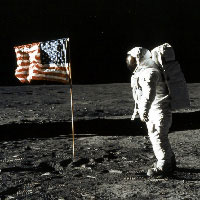Russia finally loses space race to USA
Russia has all necessary technologies and qualified specialists to hold its leadership in the space industry during the upcoming decades. The Russian space program suffers from the lack of funding, which puts the nation on the sixth place in the world following practically all space powers, save India.

Russia’s and USA’s activities in the field of space exploration do not differ much from each other. Nevertheless, Russia invests a lot less in the industry than the United States - $1.34 billion vs. $18.82 billion (14-fold difference as per 2007). Therefore, there is nothing surprising about US-made Martian rovers exploring the surface of Mars and a five-year delay in the construction of the Russian segment of the International Space Station.
Also read: Yuri Gagarin became the winner of the US-Soviet space race
The annual budget of the whole Russian space program is a little more than a half of what Russia invested in the construction of its ISS segment during ten years. For comparison: the USA has already spent $100 billion on its segment.
The ISS currently has only three Russian modules instead of the planned nine modules due to the insufficient funding. One of them, the Zvezda module, is the key module of the station, from which the building of the station was launched. Zvezda generates 5 kW of electric power which is hardly enough to maintain the normal operation of the basic system of the ISS Russian segment. Russia has to purchasing the lacking electric power from the USA . The US segment of the ISS is equipped with powerful solar batteries which general about 100 kW of power in total.
Russia plans to put two smaller research modules into operation in 2009 and 2010, a multifunctional lab module in 2011 and then add new docking ports and energy modules. As a result, Russia plans to complete the energy and construction works on its segment of the ISS by 2015, when the station ends its on-orbit life. It just so happens that the country will not have time to conduct scientific research on board the station, although that was the reason why the station was actually built.
Russia, the world’s first space power, lacks behind not only the USA, but such newcomers of the industry as he European Space Agency, China, Japan and France. The space agencies of these countries spend about $3.5 billion a year on space exploration. India currently invests a little less than one billion dollars in its space programs. It is not ruled out that the Asian country will outstrip Russia soon.
Russia (the USSR) used to take the first place in the world in the field of space exploration. It seemed back then that nothing and nobody would ever be able to push Russia off from the space pedestal.
Nowadays, Russia takes only one percent of the market of space services despite the nation’s expensive experience in building reliable spacecraft and rockets. According to experts’ estimates, the value of the space market fluctuates between $170-200 billion a year.
It is worthy of note that Russia’s space corporation, Roscosmos, will soon lose a source of its extra income - $50 million a year. The flights of space tourists on board Russian-made booster rockets will end in 2009. The crew of the International Space Station will consist of six members, whereas the Soyuz booster rocket can only carry five.
Nezavisimaya Gazeta
Subscribe to Pravda.Ru Telegram channel, Facebook, RSS!





